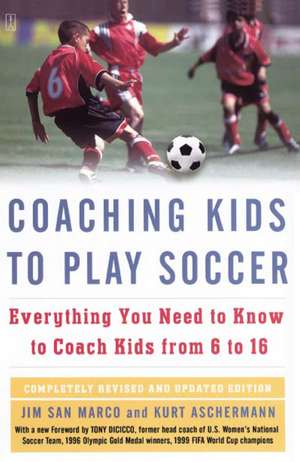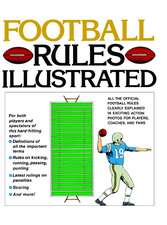Coaching Kids to Play Soccer: Everything You Need to Know to Coach Kids from 6 to 16
Autor Jim San Marco, Kurt Aschermann, Tony Diciccoen Limba Engleză Paperback – 3 sep 2007
Jim San Marco (head soccer coach at the highly successful Edgemont High School program in New York State) and Kurt Aschermann (co-author with Gerard O'Shea of Coaching Kids to Play Baseball and Softball)have written this friendly, easy-to-use, fully illustrated guide that teaches youhow to run a successful soccer team - from setting up the first practice to choosing callisthenics to running individual and team skill drills to getting everyone a ride home at the end of the game.
Emphasizing that helping kids to have funand learn about team spirit, competition, and themselves is far more important than winning games, the authors detail every step of building a soccer team that plays well and plays healthy. Instructions are fully illustrated with photos and diagrams:
* Teaching the rules
* Pre-practice preparation
* Choosing the right equipment
* Evaluating talent and assigning positions
* Drills and exercises to teach fundamentals
* Offensive and defensive tactics
* Game strategies
You may not have played much soccer or know much about it, but Coaching Kids to Play Soccerwill teach you everything you need to know. Don't start your season without it!
Preț: 81.10 lei
Nou
Puncte Express: 122
Preț estimativ în valută:
15.52€ • 16.20$ • 12.81£
15.52€ • 16.20$ • 12.81£
Carte disponibilă
Livrare economică 25 martie-08 aprilie
Preluare comenzi: 021 569.72.76
Specificații
ISBN-13: 9781416546726
ISBN-10: 1416546723
Pagini: 192
Ilustrații: 50 b-w illustrations t-o
Dimensiuni: 140 x 216 x 18 mm
Greutate: 0.23 kg
Ediția:Revizuită
Editura: Touchstone Publishing
Colecția Touchstone
ISBN-10: 1416546723
Pagini: 192
Ilustrații: 50 b-w illustrations t-o
Dimensiuni: 140 x 216 x 18 mm
Greutate: 0.23 kg
Ediția:Revizuită
Editura: Touchstone Publishing
Colecția Touchstone
Notă biografică
Jim San Marco was a teacher, athletic director, and coach at Edgemont High School in Scarsdale, New York, who finished his eighteen-year soccer coaching career with a 211-67-24 soccer record. He was recognized as the Section I Soccer Coach of the Year, New York State Section I Athletic Director of the Year, and he has served as a New York State soccer coaching clinician and a New York State Physical Education Convention speaker. He lives in Briarcliff Manor, New York.
Kurt Aschermann is currently helping to launch Charity Partners, a firm that creates fund-raising platforms for national charities, and he is a sought-after speaker, workshop leader, and consultant. A physical educator and coach, Kurt is also coauthor of Coaching Kids to Play Baseball and Softball, also published by Fireside. He is a graduate of Springfield College in Springfield, Massachusetts.
Kurt Aschermann is currently helping to launch Charity Partners, a firm that creates fund-raising platforms for national charities, and he is a sought-after speaker, workshop leader, and consultant. A physical educator and coach, Kurt is also coauthor of Coaching Kids to Play Baseball and Softball, also published by Fireside. He is a graduate of Springfield College in Springfield, Massachusetts.
Extras
Chapter 1
IT'S ALL YOURS, COACH
A simple, important, sobering fact needs to be stated at the outset: as a youth soccer coach you have a huge responsibility to everyone on the team. Not only do these youngsters want to learn soccer from you, but they also want to win, want to score some goals -- and they don't want to be yelled at. Your impact is rivaled only by that of the parent, and in certain circumstances, it surpasses that influence. You will find that your kids want to please you more than anyone else, and this simple fact can place tremendous pressure on you. It should guide your every action.
We believe that your responsibilities as a youth soccer coach are easily stated:
Fun
Learning
Individual development
Winning
...in that order! Let's look at each one in turn:
Fun: It may come as a surprise to some of the parents of the players, but 99 percent of the kids are playing soccer because they want to have fun playing it. Those kids in your charge, Coach, have joined the league and your team to enjoy themselves. The minute you lose sight of that as your principal motivating factor, you're in trouble.
Learning: Youth soccer coaches must be responsible, dedicated teachers -- more so than other youth league coaches -- because most kids in America don't know the sport! They grow up catching the things that are thrown or kicked at them, except for an occasional kickball. "Offside" is when the offensive guard (in football) moves before the ball is snapped. Couple player ignorance of soccer with magnified parental ignorance, Coach, and you can see why we put learning second on the list.
Individual Development: A nine-year-old should be compared with himself, not every other nine-year-old. You help a team develop by helping each individual. And if you've succeeded in helping most of your athletes become better soccer players by the last week of the season, you're a winning coach, regardless of your record.
Winning: We believe the outcome of the game yields winners and learners -- there are no losers. Winning is important and needs to be an important part of the development of soccer players. But perspective becomes the important consideration, because while winning is important and must be part of the education process of an athlete, it needs to be understood as the result of hard work and individual development. The coach who succeeds in teaching the sport -- individually and to a group -- will find success in the won/lost column. The coach who helps the team keep winning or losing in perspective will find success in the personal development column.
THE BALL STOPS HERE
Coaches in volunteer leagues are often acquired like goalies: no one wants to do the job, especially, so someone gets drafted. You may have come to your soccer duties purely out of love for the sport or, like many, out of love for your child. Any coach, regardless of experience, has two factors that must be dealt with quickly: (1) individual knowledge of the sport and (2) ability to impart that knowledge to the youngsters. If you have come to your soccer team because your child wanted to play and no one else was there to teach or lead the team, how you deal with the two factors may well determine if the players have a positive or a negative experience.
Copyright © 1987 by Jim San Marco and Kurt Aschermann
IT'S ALL YOURS, COACH
A simple, important, sobering fact needs to be stated at the outset: as a youth soccer coach you have a huge responsibility to everyone on the team. Not only do these youngsters want to learn soccer from you, but they also want to win, want to score some goals -- and they don't want to be yelled at. Your impact is rivaled only by that of the parent, and in certain circumstances, it surpasses that influence. You will find that your kids want to please you more than anyone else, and this simple fact can place tremendous pressure on you. It should guide your every action.
We believe that your responsibilities as a youth soccer coach are easily stated:
Fun
Learning
Individual development
Winning
...in that order! Let's look at each one in turn:
Fun: It may come as a surprise to some of the parents of the players, but 99 percent of the kids are playing soccer because they want to have fun playing it. Those kids in your charge, Coach, have joined the league and your team to enjoy themselves. The minute you lose sight of that as your principal motivating factor, you're in trouble.
Learning: Youth soccer coaches must be responsible, dedicated teachers -- more so than other youth league coaches -- because most kids in America don't know the sport! They grow up catching the things that are thrown or kicked at them, except for an occasional kickball. "Offside" is when the offensive guard (in football) moves before the ball is snapped. Couple player ignorance of soccer with magnified parental ignorance, Coach, and you can see why we put learning second on the list.
Individual Development: A nine-year-old should be compared with himself, not every other nine-year-old. You help a team develop by helping each individual. And if you've succeeded in helping most of your athletes become better soccer players by the last week of the season, you're a winning coach, regardless of your record.
Winning: We believe the outcome of the game yields winners and learners -- there are no losers. Winning is important and needs to be an important part of the development of soccer players. But perspective becomes the important consideration, because while winning is important and must be part of the education process of an athlete, it needs to be understood as the result of hard work and individual development. The coach who succeeds in teaching the sport -- individually and to a group -- will find success in the won/lost column. The coach who helps the team keep winning or losing in perspective will find success in the personal development column.
THE BALL STOPS HERE
Coaches in volunteer leagues are often acquired like goalies: no one wants to do the job, especially, so someone gets drafted. You may have come to your soccer duties purely out of love for the sport or, like many, out of love for your child. Any coach, regardless of experience, has two factors that must be dealt with quickly: (1) individual knowledge of the sport and (2) ability to impart that knowledge to the youngsters. If you have come to your soccer team because your child wanted to play and no one else was there to teach or lead the team, how you deal with the two factors may well determine if the players have a positive or a negative experience.
Copyright © 1987 by Jim San Marco and Kurt Aschermann
Cuprins
CONTENTS
Foreword
Preface
1. It's All Yours, Coach
2. General Guidelines for Parents, Players and Coaches
3. Pre-Practice Preparation
4. 25 Important Things Your Players Should Know
5. The Rules of the Game and Dimensions of the Field
6. Juggling
7. The Skills of Soccer
8. Exercises to Improve Skills
9. Goalkeeping
10. Offensive Tactics
11. Defensive Tactics
12. Restarts
13. Systems of Play
14. Pre-Game Check List
15. Practice and Pre-Game Warm-up Routine
Some Concluding Thoughts
Glossary
General Resources
















